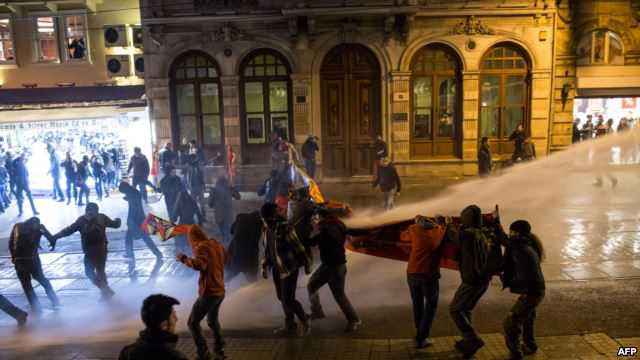Dorian Jones
Police use a water cannon to try to disperse people protesting against newly proposed restrictions on the use of the internet and against the Turkish government during a protest on the Istiklal Avenue in Istanbul, Jan. 18, 2014.
ISTANBUL — The Turkish government is facing growing criticism over its proposals to control Internet use. The moves come with the government mired in corruption allegations.
The center of Istanbul became a battleground, with police using water cannons and tear gas to disperse a mid-January demonstration against government proposals to control the Internet. Were the proposals to become law, Internet service providers would be compelled to block websites within four hours of being ordered to do so by the government, block key word searches if so ordered, and keep customers’ user information for two years.
Lawyer Selin Kaledelen of the Korsan website, which campaigns for freedom of information, said the government’s Internet proposals are aimed at stifling allegations of high-level government corruption. “My reaction? I was not shocked because I was waiting for that … This law gives the opportunity of the authorities to block these websites within four hours,” he explained. “So for me, it’s dictatorship of the authorities in terms of law. It’s a censorship law and we don’t recognize it.”
In December, a major judicial probe was launched into alleged high-level government corruption. Prime Minister Recep Tayyip Erdogan responded by reassigning thousands of police officers and prosecutors linked to the investigation, saying the probe was a unfairly targeting government allies.
Political analyst Cengiz Aktar of the Istanbul Policy Forum says the new law is part of a worrying trend. “This is probably the last nail on the already ailing Internet freedom in this country. The law of 2007 was already very restrictive. Turkey was one of the worst countries in terms of Internet freedom even now. We will see how far it will go. It’s always very difficult to cut all links from the world to make Turkey something which would look like North Korea. But these are desperate moves by the government,” he said.
But the government insists the proposals are just about protecting people’s privacy and are in line with international standards.
Under existing legislation, Turkish courts have blocked more than 40,000 websites, one of the highest figures in the world. Popular sites such as YouTube have been banned for several years.
Yaman Akdeniz, a professor of law and expert on cyber freedoms at Istanbul’s Bilgi University, questions the effectiveness of such controls.
“Turkish people, since the of blocking access to YouTube, have become very much knowledgeable about the Internet and related matters,” said Aktar. “If somebody wants to access information, you will not be able to stop them as long as they know the information is out there.”
With Prime Minister Erdogan’s ruling AK Party enjoying a large majority in parliament, it’s expected that the Internet reforms will become law. But Selin Kaledelen of the Korsan website predicts the government will face an increasingly bitter battle over Internet freedom.
“I don’t think they will succeed now. People like us will talk. It’s not just about government corruption, it can be any case. So we will have additional routes and roads to communicate in the future. They can’t stop us. But maybe they can build their own cyber army, because they are doing that. They are hiring some computer scientists, or coders and hackers. They are building their own crew,” stated Kaledelen.
A recent Turkish opinion poll found 64 percent of people did not believe the country’s mainstream media were freely covering government corruption allegations. Observers say the Internet is increasingly seen as an important alternative source of news. With Turkey entering into an 18-month period of elections, the outcome of the battle over Internet freedom is expected to have far reaching consequences for the country.
via Turkey’s Crackdown on Internet a Matter of Politics.

